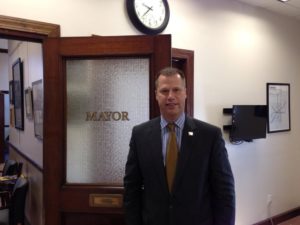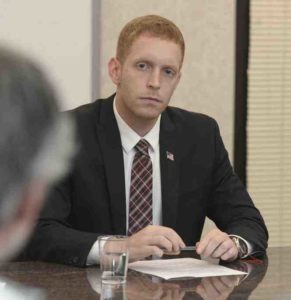Republican President-elect Donald Trump made a lot of big promises on the campaign trail. One of them: cancel all federal funding to “sanctuary cities” on his first day in office.
That’s a sweeping promise, and it could have an impact in New England if it happens.
First, what is a sanctuary city? Los Angeles is one, so is New York, Chicago and the entire state of Connecticut. They’re also smaller communities, including Amherst, Holyoke and Northampton in western Massachusetts.
The term refers to communities that do not comply with some orders from federal Immigration and Customs Enforcement (ICE). For example, if ICE asks local police to detain an immigrant suspected of living in the country illegally, those police are barred from doing it. There are exceptions if there’s a court order or criminal warrant for a person’s arrest.

“The position is really that local law enforcement, which doesn’t have the authority to enforce federal immigration laws…are opting not to do that,” said Northampton Mayor David Narkewicz.
Narkewicz issued an order creating his city’s policy in 2014. So did Holyoke Mayor Alex Morse.
“We want no one to be scared of talking to our officers and our city officials,” Morse said.
So that’s the idea behind so-called sanctuary cities. But could President-elect Trump actually end all federal funding to Northampton or Holyoke? Yes, according to John Hudak, a senior researcher at the Brookings Institution who studies presidential power. There are two ways this could happen, Hudak said. One is through executive action, but that would face legal challenges.
You can bet that if an executive order or other kind of executive action is issued on January 20th to that effect,” Hudak said, “states and localities will sue.”
Hudak said if that happens, federal funding would likely continue to flow while the measure is in court. The other option would be to push a law through the Republican-controlled Congress.
“It would probably say ‘any city that is violation of federal immigration law will not be entitled to federal discretionary funding,'” said Hudak.
According to Hudak, that approach could have a more immediate effect. So what would be at stake for sanctuary communities if a de-funding bill made it through?

“Lots of different areas,” according to Northampton’s David Narkewicz.”We receive Community Development Block Grant funding…which helps us support low- and moderate-income residents of our community.”
Holyoke and Amherst get those funds too. Plus, lots of transportation funding comes to cities and towns from the federal government through the state. Overall, though, federal money is a fairly small part of the budgets for these communities. Mayor Narkewicz said the threat of losing that funding changes nothing for him.
“In terms of the executive order that I issued, no, I don’t have any plans to reverse that because of what happened on November 8th,” he said.
In Holyoke, Mayor Morse is also standing by his policy. He also makes an important distinction about his city’s population, which is 48 percent Hispanic or Latino.
The majority of our Latino community is Puerto Rican and so they are not considered immigrants. They are United States citizens that don’t have to grapple with the same legal, bureaucratic situations that many of our immigrant communities do have to face,” said Morse.
Morse, who is white, said that speaks to a larger point.
“Immigrant or not, any talking point or policy about criminalizing or prosecuting or deporting immigrants in our community will target people that don’t look like me, and I think that’s incredibly dangerous rhetoric,” Morse said.
For now, local sanctuary city policies are here to stay. And for the record, both Mayors Morse and Narkewicz said, to their knowledge, there haven’t actually been any instances where local police have ignored federal immigration requests to detain people.





